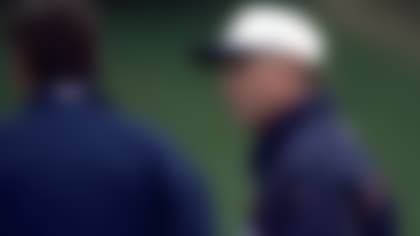BOSTON (AP) - Junior Seau's death got former New England Patriots linebacker Ted Johnson thinking again about his own career in the NFL and his struggles with post-concussion syndrome after he retired in 2005.
"It's corrode or explode," Johnson told a conference on pediatric concussions at Boston Children's Hospital on Friday. "And it all exploded by killing (himself)."
Seau shot himself in the chest on May 2, echoing last year's suicide of former Chicago Bears defensive back Dave Duerson. Duerson left a note asking for his brain to be studied for signs of brain trauma; no link has been established between Seau's death and the pounding he took during his football career, but Johnson was convinced it was a factor.
"You can't tell me the head trauma he had over his career didn't affect him," Johnson said. "That was the tip of the tipping point for me. ... It makes you take inventory on your own mortality. If that can happen to him, I've got to be more diligent in how I live my life. `Cause it's a road I don't want to go down."
Johnson played 10 years in the NFL - all of it for the Patriots - before retiring at the age of 32 on the first day of `05 training camp when he began to fear the next big hit.
"As a middle linebacker, my job is to initiate contact. It's not to run away from contact," he said. "I knew it was over for me, because I knew I wasn't going to be the same player."
What followed were the typical symptoms of what is now recognized as post-concussion syndrome (along with an addiction to stimulants), but no diagnosis. One doctor wanted to send him to electroshock therapy, but instead he asked concussion guru Chris Nowinski for his opinion and got referred to Dr. Robert Cantu, a leading concussion expert, instead.
Finding out that he was suffering from a recognized disease - and that he was not alone - was a relief.
"It's a shame-based issue," he said, calling concussions the "invisible injury." "You can't see into the brain. ... It makes you feel like less of a man."
Johnson said he thought the NFL had improved its procedures for dealing with head injuries, and he thinks players will no longer be pressured to come back too soon after a concussion. He thought Seau's death will also help bring attention to the problem.
But he said players might need to be convinced to speak up for themselves - even in a league where contracts are not guaranteed.
"That dynamic in itself creates a lot of problems," Johnson said. "You don't want to get labeled as a guy that's easily concussed."
Johnson said his problems started after a concussion in a 2002 game, when he got his "bell rung," he said. Four days later he was back at practice and he was concussed again. In a 2007 newspaper article, Johnson said coach Bill Belichick pressured him to return before he was ready.
"It's as clear as a bell, `I had to see if you could play,"' Johnson recalled Belichick saying, according to The New York Times.
"I was put in a position where I felt compelled to play against doctors' orders, so I did," Johnson said Friday, adding later that he held no grudge against Belichick, the Patriots or the NFL.
Asked whether he would play football again, knowing what he does now, Johnson thought and listed all of the things the NFL made possible for him.
But he did take issue with current and former players, including Patriots receiver Chad Ochocinco, who said players know what they sign up for when they playing the NFL. That might be true now, but it wasn't just a few years ago, Johnson said.
"You guys hardly ever get hit," Johnson said, mentioning Ochocinco and Cris Carter by name. "You don't ever get hit in practice. And when you do, you complain about it."



